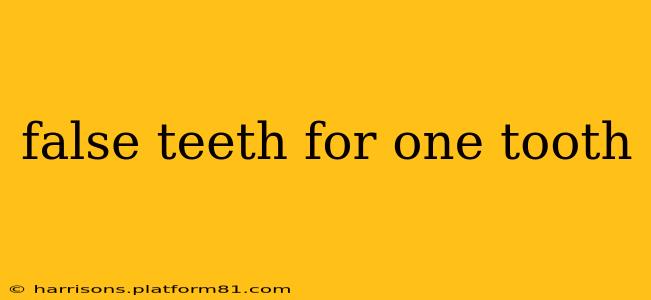Losing even a single tooth can significantly impact your confidence, chewing ability, and overall oral health. Fortunately, modern dentistry offers several effective solutions to replace a missing tooth, even if it's just one. This comprehensive guide explores the various options available for replacing a single tooth, helping you make an informed decision based on your individual needs and budget.
What are the different options for replacing one missing tooth?
This is a common question, and the answer depends on several factors, including the health of your surrounding teeth, your budget, and your personal preferences. The main options include:
-
Dental Implants: These are titanium posts surgically placed into the jawbone to serve as a root for a replacement tooth. Once integrated, a crown is attached, creating a permanent and highly natural-looking solution. Implants are known for their strength, durability, and long-term stability, effectively restoring both function and aesthetics. They're often considered the gold standard in tooth replacement.
-
Dental Bridges: A bridge is a prosthetic that spans the gap created by the missing tooth, supported by the adjacent teeth. It usually involves crowns cemented onto the neighboring teeth, with a false tooth (pontic) in between. Bridges are a more affordable option than implants but may require more preparation of the adjacent teeth.
-
Partial Dentures: While often associated with replacing multiple teeth, partial dentures can also be used to replace a single missing tooth. They are removable and typically consist of a plastic base with artificial teeth attached. They are a less expensive option but may not offer the same level of stability and comfort as implants or bridges.
-
Removable Partial Denture with a Precision Attachment: A less commonly known option, these partial dentures utilize a precision attachment like a ball and socket or bar clasp to attach to a neighboring tooth. This option improves stability and comfort over a standard partial denture.
How much does it cost to replace one tooth?
The cost of replacing a single tooth varies considerably depending on the chosen method and other factors like your location and the dentist's fees. Dental implants generally represent the higher end of the cost spectrum, while partial dentures are typically the most affordable option. It's essential to consult with your dentist for a personalized cost estimate based on your specific situation.
Are there any non-surgical options for replacing one missing tooth?
Yes, dental bridges and partial dentures are non-surgical options. They do not require any invasive procedures like implants. However, dental bridges do require preparation of the adjacent teeth.
How long does it take to replace one missing tooth?
The timeline varies depending on the chosen method. Dental implants require several months due to the healing and integration process. Bridges usually take a couple of appointments, and partial dentures can be fitted relatively quickly. Your dentist will provide a detailed timeline during your consultation.
What are the pros and cons of each option?
Let's compare the pros and cons of the main options:
Dental Implants:
Pros: Strong, durable, long-lasting, natural-looking, preserves jawbone density. Cons: More expensive, requires surgical procedure, longer treatment time.
Dental Bridges:
Pros: Less expensive than implants, relatively shorter treatment time. Cons: Requires preparation of adjacent teeth, may not last as long as implants.
Partial Dentures:
Pros: Least expensive option, removable for cleaning. Cons: Can be less comfortable, may not be as aesthetically pleasing, requires good oral hygiene.
Removable Partial Denture with Precision Attachment:
Pros: Improved stability and retention compared to standard partial dentures. Cons: Still removable, may require more meticulous cleaning.
Which option is best for me?
The optimal solution depends on your individual needs, budget, and overall oral health. A thorough consultation with a dentist or prosthodontist is crucial to determine the most suitable option. They will assess your oral health, discuss your preferences, and recommend the best course of action. Don't hesitate to ask questions and clarify any concerns you may have. Choosing the right method will ensure the long-term health and aesthetics of your smile.
